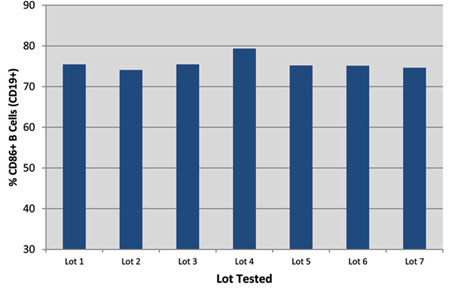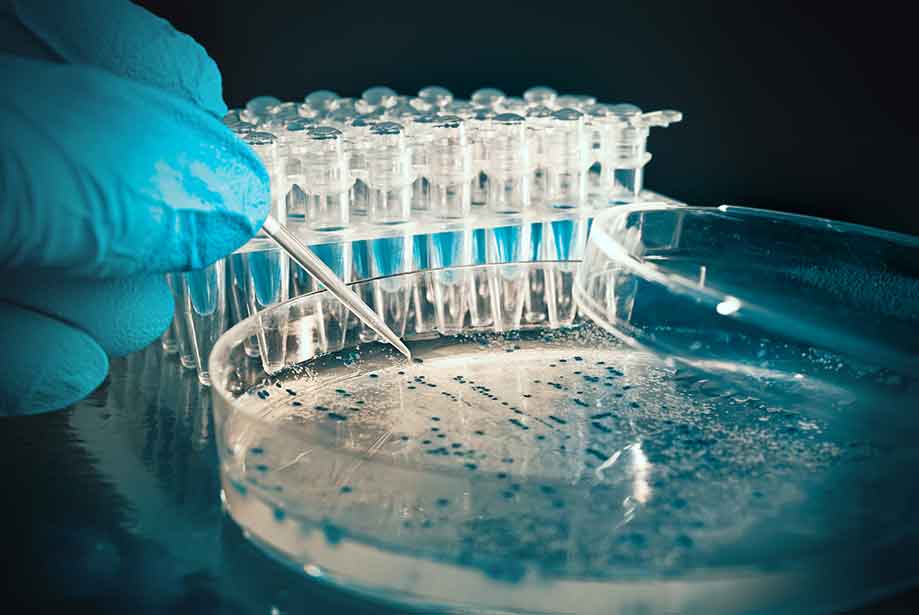Proteins are the workhorse in biological systems facilitating most of biological processes in a cell, including gene expression, cell growth, proliferation, nutrient uptake, intercellular communication and apoptosis. The blue print for protein synthesis is stored in DNA, which serves as a template for highly regulated transcriptional processes to produce messenger RNA (mRNA). The message coded by mRNA is then translated into defined sequences of amino acids that form a protein. Proteins are synthesized in a similar two-step process in all organisms – DNA is first transcribed into RNA, then RNA is translated into protein.
What are recombinant proteins?
Recombinant proteins are proteins encoded by recombinant DNA that has been cloned in an expression vector that supports expression of the gene and translation of messenger RNA. Modification of the gene by recombinant DNA technology can lead to expression of a mutant protein. Recombinant protein is a manipulated form of native protein, which is generated in various ways in order to increase production of proteins, modify gene sequences, and manufacture useful commercial products.
How are recombinant proteins made?
Recombinant protein production begins at the genetic level, where coding sequence for the protein of interest is first isolated and cloned into an expression plasmid vector. Most recombinant proteins for therapeutic use are from humans but are expressed in microorganisms such as bacteria, yeast, or animal cells in culture. Human genes are very complex, often containing non-coding DNA sequences known as introns. Therefore, an intron-free version of the gene is often made by converting the mRNA into cDNA. Because the cDNA lacks regulatory regions, the expression vectors provide promoter, ribosome-binding site, and terminator sequences. Recombinant protein production for research purposes is mainly driven by the cost-effectiveness, simplicity, and speed of the process in conjunction with adequate yields of the product. Proteins co-expressed in bacteria would not possess post-translational modifications, e.g. phosphorylation or glycosylation; eukaryotic expression systems are needed for this.
Many recombinant proteins require protein modifications, such as glycosylation, that are available only in eukaryotic cells. Yeast, insect cells, and mammalian cell culture systems offer such post-translation modifications. Over the past decade, efficient transient transfection protocols have reportedly been developed. HEK293-derived cell lines are employed for transient production of proteins. Currently, most recombinant therapeutic proteins are produced in mammalian cells because mammalian cells are capable of producing high-quality proteins similar to the naturally occurring ones. In addition, many approved recombinant therapeutic proteins are generated in
E.coli due to its well-characterized genetics, rapid growth, and high-yield production.
What are recombinant proteins used for?
Biomedical research to understand health and disease
Recombinant proteins are useful tools in understanding protein-protein interactions. Protein interactions are fundamentally characterized as stable or transient and play an important role in cellular processes. Recently, RP microarrays for examining protein-protein interactions have become popular. For this approach, researchers seed a slide with numerous immobilized proteins, which they then treat with a variety of molecules to examine how the two agents interact with one another. Using this system, scientists have studied protein interactions with other proteins or peptides, enzymes, small molecules, lipids, and nucleic acids. This allows for much higher throughputs when it comes to studying protein-protein interactions.
Recombinant proteins have proven performance in several laboratory techniques, such as ELISA, western blot and
immunohistochemistry (IHC). Recombinant protein are used to develop enzymatic assays. When used in conjunction with a matched antibody pair, recombinant proteins can be used as standards in
ELISA, and as positive controls in
western blots, and IHC. Recombinant proteins serve as valuable tools for investigating cellular response to stress, and disease situations. Recombinant proteins and peptides administered to animal models of disease assist researchers in identifying novel potential therapeutic candidates.
Recombinant proteins for biotherapeutics
Most human diseases are systemically or partially related to dysfunction of specific proteins. Therapeutic proteins provide important therapies for a variety of diseases, such as diabetes, cancer, infectious diseases, hemophilia, and anemia. Common therapeutic proteins include antibodies, Fc fusion proteins, hormones, interleukins, enzymes, and anticoagulants. Human proteins obtained through genetic engineering play a key role in therapeutic medicines market. One of the many RP vaccines approved by the FDA is the Hepatitis B vaccine for prevention of infection caused by all known subtypes of the Hepatitis B virus.
The first recombinant protein used in treatment was recombinant human insulin in 1982 and the RP industry has rapidly grown since. To date, more than 130 RPs have been approved by the US FDA for clinical use. However, more than 170 RPs are produced and used in medicine worldwide. Recombinant human insulin was a very early example of the use of biotechnology in drug development. Recombinant proteins are potent medicines that are safe from off-target side effects, and take a shorter time to develop than small molecules. All Big Pharma now develop RP as drugs and thus, it is a multibillion dollar industry.
Recombinant proteins used in the clinic include recombinant hormones, interferons, interleukins, growth factors, tumor necrosis factors, blood clotting factors, thrombolytic drugs, and enzymes for treating major diseases such as diabetes, dwarfism, myocardial infarction, congestive heart failure, cerebral apoplexy, multiple sclerosis, neutropenia, thrombocytopenia, anemia, hepatitis, rheumatoid arthritis, asthma, Crohn’s disease, and cancers therapies. Backed by numerous peer-reviewed citations, Enzo offers an extensive range of recombinant and native proteins for a variety of research fields. Our proteins are validated in specific functional assays and are manufactured to the highest stringent quality.

|
Figure 1: Figure 1. Reliable manufacturing yields consistent results. MEGACD40L Protein from 7 consecutive manufacturing lots were tested using B-cell activation assay at 1000 ng/ml.
|
Recombinant proteins are used in food production, agriculture, and bioengineering. For example, in the breeding industry, enzymes can be added to animal feed to increase the nutritional value of feed ingredients, reduce feed and waste management costs, support animal gut health, enhance animal performance and improve the environment. Additionally, lactic acid bacteria (LAB) have been used for a long time for the production of fermented foods. Recently, LAB has been engineered for the expression of recombinant proteins, which will have a wide range of applications such as improving human/animal digestion and nutrition.
Advancements in the field of biotechnology have increased and facilitated the production of recombinant proteins for various applications. The importance of RP has increased rapidly for basic life science research, diagnostic reagents and therapeutic drugs. Their role in biotechnology is irreplaceable. We also look forward to seeing more progress in the treatment of various diseases with recombinant proteins.
Enzo’s catalog of widely cited and thoroughly validated native and recombinant proteins will help accelerate this research. Our decades of experience in the design and manufacturing of active enzymes, and drug discovery kits offers tools to screen inhibitors of specific enzymes and identification of a potential therapeutic target. Please contact our
Technical Support Team for further assistance.










